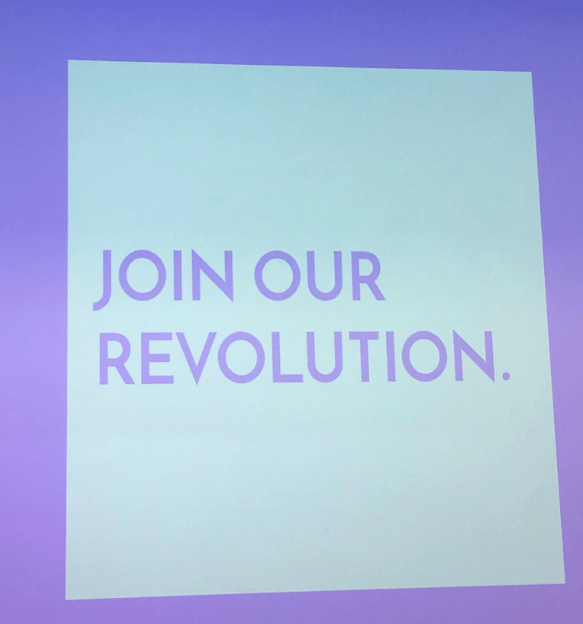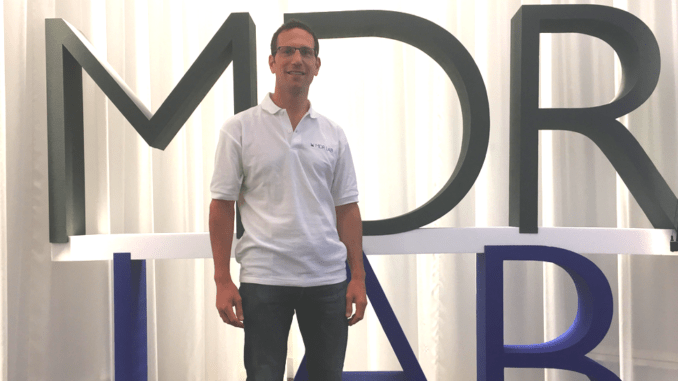
Yesterday was MDR LAB’s Demo Day, celebrating the culmination of the second cohort in Mishcon de Reya’s legal tech and prop tech incubator. Five startups were there, along with two from the previous cohort, plus a packed room of lawyers, a ‘who’s who’ of legal tech land, as well as some investors, plus of course the team at Mishcon that put the whole thing together and helped to make it such a success for a second time.
For those who don’t know what MDR LAB is, it is an opportunity for startups to live within the law firm for 10 weeks, to develop their products hand in hand with Mishcon’s lawyers and to get real world feedback that can truly shape their future. The benefit to the lawyers is that they get to learn about what this tech can do, become more engaged with innovation as a whole, and also help to shape some of the tech that in many cases they will then go on to use in their practice. What’s not to like?
So, without further ado….
First up was Nick West (pictured above), CTO of Mishcon and the driving force behind MDR LAB. He welcomed everyone and noted that over 130 startups had applied to join the second cohort. Only five were chosen. These were:
Founded in September 2017 and based in London, Thirdfort is planning to revolutionise the property sector in the UK by providing a whole new platform for property transactions, including a new approach to escrow accounts that will increase efficiency and reduce fraud. (See AL feature here.)
– dealWIP
Based in Brooklyn, New York, dealWIP was founded in June 2017. It has a user-stage product: an integrated legal workspace platform for transactional lawyers. (See profile of dealWIP in AL here.)
– LitiGate
LitiGate was founded by experienced litigator Nimrod Aharon and AI expert Guy Uziel and is based in Tel Aviv. LitiGate offers an arguments analysis solution for dispute resolution using advanced AI algorithms. The company aims to revolutionise the conduct of litigation by delivering contentious legal services faster, at less cost and with improved accuracy.
Founded in 2016 and based in San Francisco, Digitory Legal has a user-stage product: a pricing prediction and management tool for litigators. Using historical data and industry trends, it helps customers understand what legal matters cost and why.
London-based LawPanel was founded in January 2016. It is at user-stage with its online trademark management platform, designed to allow firms to deliver more of their services online.
—
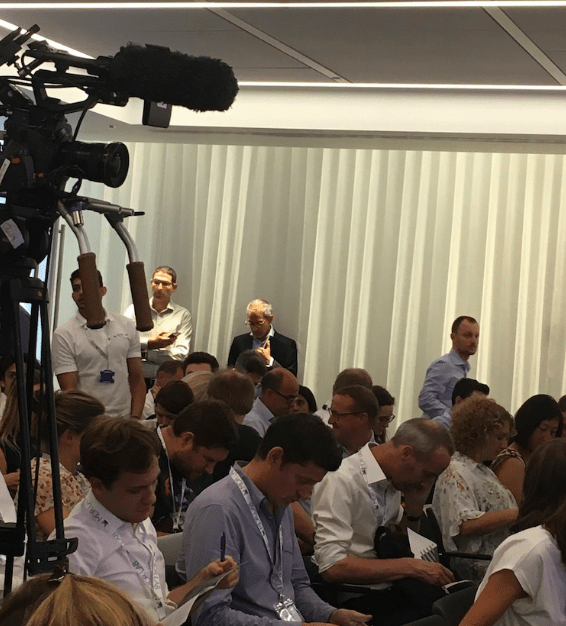
West went on to state that the firm wanted to be at the forefront of the change that is taking place in the legal market. He also thanked the more than 20 people at the firm who had played a part in the incubator, from mentoring to helping to run the LAB.
And it’s important to note the input of the LAB’s Robyn Weatherley, who played a key role in running the LAB on a daily basis.
One comment from West that really stood out was this one: ‘I have the utmost respect for all the startups. I have often thought about starting a business. I don’t have the guts. You gave up jobs. You have tried to live your dream. You are the real heroes today.’
Talk about ‘skin in the game’…..As West rightly points out, when you give up a safe job to launch a business and put everything in your life in play……that is really putting skin in the game. In short, you are really risking something and doing that takes guts – and to succeed is a huge amount of work and takes a lot of talent. You actually want to see innovation at work? Check these startups out.
Next up was Ed Boulle, cofounder of Orbital Witness, one of the first cohort, which has gone on to great things and even gained funding from the European Space Agency.
‘[At the LAB] we could really understand what the lawyers wanted and develop prototypes to test with the lawyers and then go away and make our product better. We also needed to get cash, build the product, and get noticed – the LAB helped with all of those things,’ said Boulle.
Then came Ryan Alshak, cofounder of US-based Ping, the time recording pioneer. He echoed this message, but then added: ‘We got two things we didn’t expect – true partnership and friendship.’
Alshak told the story of how West had been incredibly supportive and that being in the LAB had helped the company to get investment in Silicon Valley from tier one investors, with Mishcon effectively as the company’s key endorsement. He concluded that when the story of Ping is written one day in the future the ‘most important chapter will be about MDR LAB’. And that’s a ringing endorsement as well.
And now the five startups from the second cohort.
First up, DealWIP. Two of the cofounders, Alex Nordholm and James Clarkin-Breslin made their 10 minute presentation and told their story about the journey from law school to Big Law to realising that deals could be made to run so much more smoothly.
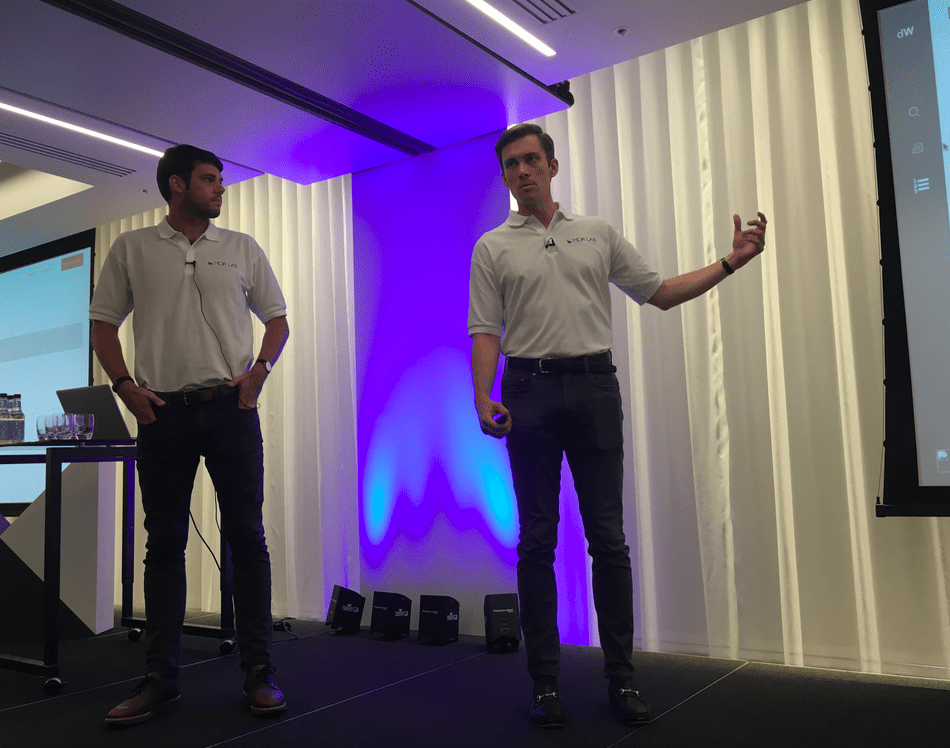
The pair explained that on arriving at MDR LAB they had wanted ‘to do it all immediately, but saw that we coudn’t do all of it at the same time’ when it came to developing their deal platform. So they took a more focused approach and started by doing a series of interviews with lawyers to understand their biggest pain points. These were:
- Inefficiencies – highly paid lawyers doing low level tasks.
- Human error – if do this work manually, then can make a mistake.
- Lack of transparency – deal master file held by one associate that partners can’t see.
And they concluded that diligence co-ordination was the top issue in terms of what they should focus the platform on to start with. So, they started building for this in June. Now they are looking for investment to keep developing and it’s all going well.
The key takeaway here is that MDR LAB allowed the company to really get to the meat of the matter and learn what it needed to make a priority. In return, it also helped the lawyers at the firm to ensure the platform delivered the kind of solution that really mattered to them. It’s a win-win.
Next – LitiGate – with CEO and Cofounder, Nimrod Aharon, which has developed a machine learning and NLP system that analyses legal arguments and highlights all the issues, which helps you to respond. It is probably fair to say this is the most ambitious technologically of the five, given the complexity of the NLP and semantic analysis they are grappling with. But they appear to be well on the way already and showed some examples of what they can do.
Aharon noted that ‘MDR LAB validates the problems professionals have’, and helped them to be sure they were on the right track. He also noted that a group of ‘normally competing firms’, Taylor Wessing, Baker McKenzie and Mishcon, had got together to help the company to train up its system. Another great example of forward thinking from law firms.
Interestingly one of the questions from the audience was about possible knowledge leakage from one firm to another. The answer was: no, use of the system just makes it better for all. How each firm uses it is their business.
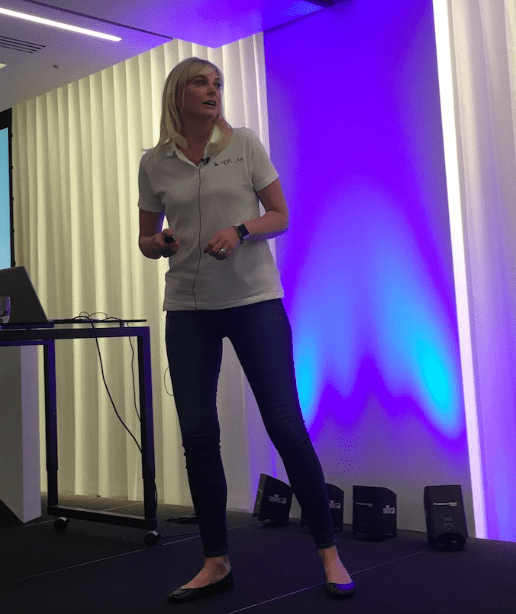
He also announced they will launch a version of LitiGate for high volume claims, so that businesses such as insurance companies can exploit the tech for less complex, but highly numerous matters.
Then, Digitory Legal, the US-based legal spend estimation company, with CEO Catherine Krow, explaining that being in the UK now was good timing because of the changes in how courts set fee criteria, known in litigation circles as the ‘J-Codes’. In short, litigation spending is getting reined in and no law firm wants to do a tonne of work they’ll never get paid for. Hence……Digitory.
Krow noted that working with MDR LAB had really helped as they had access to lots of billing data on which they could then build English law-relevant fee templates for a variety of different kinds of litigation work. This then allowed the lawyers at the firm to better estimate what a matter would cost.
Then, Thirdfort, with cofounders, Olly Thornton-Berry and Jack Bidgood, which as noted is seeking to change how property transactions work. They asked the audience who had bought a property and who had a great experience in the process. From that moment the room seemed hooked, perhaps because it was an issue that many there could empathise with even if they were not property lawyers.
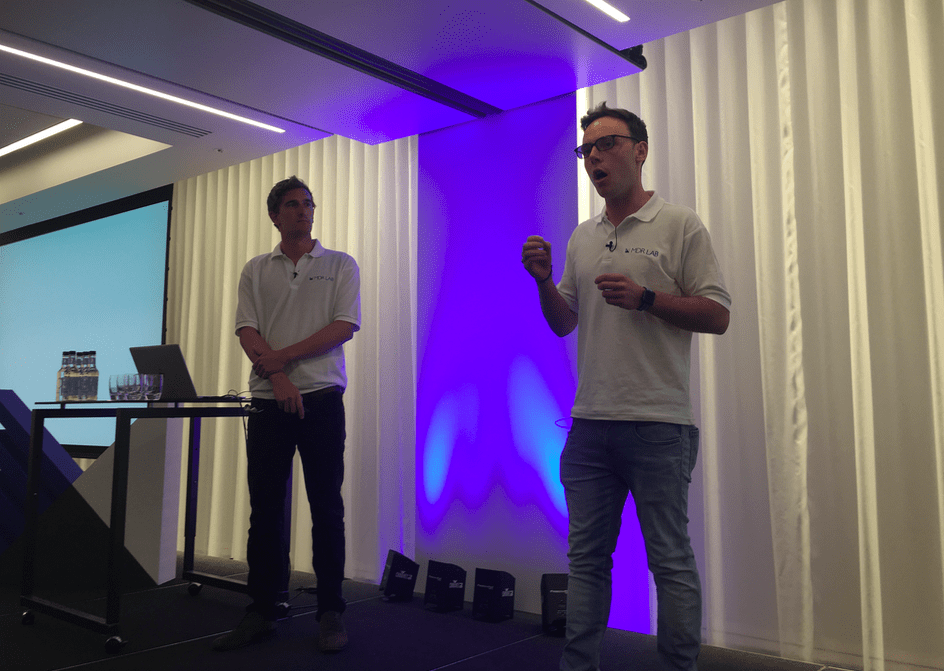
There are several parts to the platform, such as easy to use digital onboarding/KYC and Thirdfort taking on the stress and process of holding client monies. This takes the risk away from lawyers and also improves the efficiency of the transaction.
They noted that they can reduce onboarding time by 80% and reduce the number of steps the money in a transaction needs to pass through, also reducing time. In the UK, property transactions are very slow compared to most developed nations, and the company is hoping – quite rightly – that there is huge unmet demand for change here.
They hope to test out live escrow transactions with Mishcon and that now seems more likely as they are to receive a licence from the financial regulator, the FCA. This is clearly just the beginning, but MDR LAB will also have played its part in helping the company to grow, gain bona fides from a well-known law firm, and improve their platform.
And finally, LawPanel, which helps companies and lawyers better handle trademarks. A great example of uploading 500 trademarks into the system in five seconds was shown and it was impressive. They are also working with the firm’s IP team to develop the product further.
Conclusion
Some may doubt the benefits of incubators, or even of startups engaging with law firms at this early stage in their development. But, if you speak to the startups at MDR LAB they are seriously pleased that they have done this. In fact, many say that the LAB has been fundamental to their success, allowing them to experiment with the lawyers and make something that the lawyers really want. It gives them a better product, faith that they are on the right track and the credibility of having worked closely with a well-known law firm. In short: invaluable.
On the lawyers’ side, as noted, there are huge benefits from learning about and shaping this tech. And they will likely never get this kind of close proximity to a new legal tech or prop tech company in normal life. The LAB gives them access to cutting edge tech that is chosen because it looks relevant to the lawyers at the firm. None of the startups are pie in the sky applications, all are very real and very applicable to the work the firm does. In short: real innovation, and dare I say it, transformation of how work is performed.
All in all, a great success. May MDR LAB keep going for many, many years to come.
